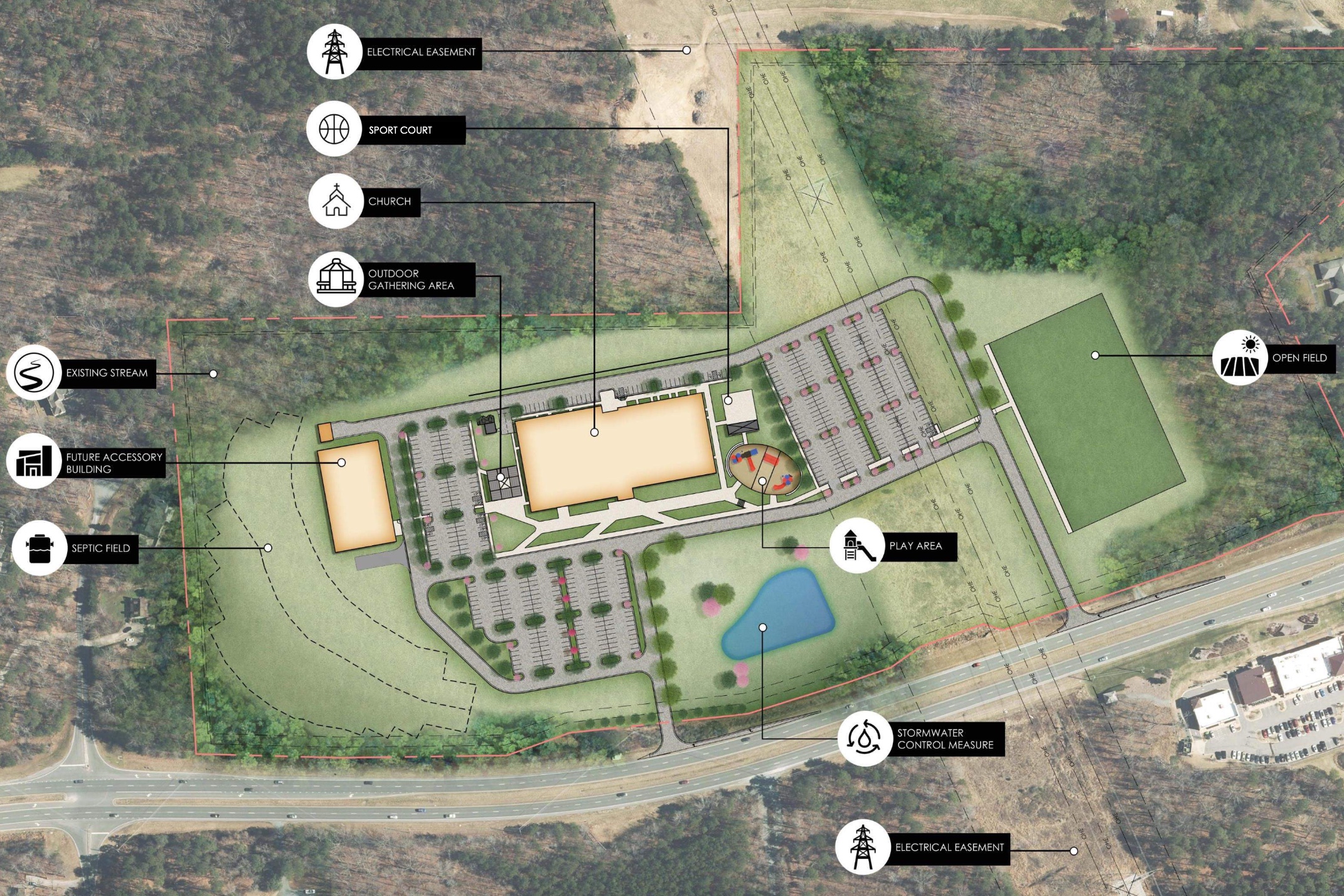
Architectural rendering of a proposed new campus of The Summit Church in Chatham County, N.C. The county’s Board of Commissioners denied The Summit’s rezoning request in December 2024.
DURHAM, N.C. — The U.S. Department of Justice has filed a statement of interest in support of a lawsuit brought by The Summit Church against the Chatham County Board of Commissioners which alleges that the county denied the church’s rezoning request to build a new worship facility for religious reasons.
The Justice Department’s Civil Rights Division filed the statement in support of The Summit Church’s claims that the county violated provisions of the Religious Land Use and Institutionalized Persons Act (RLUIPA) of 2000 in its decision, according to an announcement made Tuesday, April 22. RLUIPA is a federal law that protects individuals and religious groups from discrimination in zoning and landmarking laws.
“RLUIPA protects the rights of religious groups to exercise their faith free from the precise type of undue government interference exhibited here,” Assistant Attorney General Harmeet K. Dhillon of the Justice Department’s Civil Rights Division said in the announcement. “The Civil Rights Division is committed to defending religious liberties as our founders intended and as federal law requires.”
The Summit Church filed the lawsuit against the Chatham County Board of Commissioners in U.S. Middle District Court on Feb. 14. The suit stems from the county’s unanimous decision in December 2024 to deny the church’s request to rezone three parcels of land to build a permanent location for its Chapel Hill campus, which currently meets in a local high school. The Summit Church is a multisite congregation that has 13 campuses across the Triangle region of North Carolina.
In its complaint, The Summit claimed that the denial of its rezoning applications treated the church on less than equal terms than nonreligious assemblies and imposed an unjustified substantial burden on its religious exercise. The Summit Church is seeking a preliminary injunction that would require the county to approve the church’s rezoning request and associated site plan for the worship facility.
On March 27, attorneys for Chatham County filed a motion to have the lawsuit dismissed, arguing that the court lacks jurisdiction in the case because rezoning decisions are legislative acts under state law and are matters of separation of powers. Attorneys for the county also refuted claims that the county violated any of The Summit Church’s civil or religious rights in rejecting the church’s rezoning application.
In court documents filed Thursday, April 16, opposing the county’s motion to dismiss the lawsuit, attorneys for The Summit Church said that the “Defendant’s arguments run contrary to the very purposes of RLUIPA and should be rejected.”
The subsequent statement of interest filed by the Justice Department expressed similar sentiments.
“RLUIPA, however, applies to ‘zoning’ laws—state or local law definitions notwithstanding—and authorizes courts to grant injunctive relief,” the statement of interest said. “Courts applying RLUIPA, in this Circuit and elsewhere, have routinely granted injunctive relief in line with what the Plaintiff seeks here—an order ‘enjoin[ing] the County’s violations of RLUIPA so that it may build a permanent home for its Chapel Hill Campus.’ … Accordingly, the Court should deny the County’s motion to dismiss.”
In a statement provided by email, Chatham County Attorney Bob Hagemann acknowledged the Justice Department’s statement of interest and maintained the county “acted consistently” with federal law and did not act “with animosity” toward the church in denying the rezoning request.
“Chatham County is aware that the U.S. Department of Justice filed a Statement of Interest in this case,” Hagemann said. “The Statement does not, however, alter the County’s belief that the Board of Commissioners acted consistently with Federal law when it denied The Summit Church’s legislative rezoning request. More specifically, the County rejects the notion that it acted with animosity toward the Church and reinforces that it respects and supports the right of its residents to freely hold and exercise their religious beliefs.”
In an updated statement regarding the case provided by email, The Summit Church said it was “thankful” for the Department of Justice’s statement of interest in the case.
“On Feb. 14, 2025, The Summit Church challenged the Chatham County Board of Commissioners’ December 2024 decision to deny us the right to build a permanent facility for our Chapel Hill campus by filing a federal suit.
“Launched in 2013, Summit’s Chapel Hill campus currently meets at East Chapel Hill High School. A permanent facility would permit more flexibility for ministry, and allow us to more effectively serve the surrounding community, as we seek to do with all of our campuses in the Triangle.
“The Board of Commissioners unanimously rejected our rezoning request, claiming that we were too big, after previously approving large commercial, retail, and residential developments on our parcel or within close proximity to our proposed location. Their statements also made it clear that our church is not welcome at all in the County. We view this to be unjust and in violation of federal law, specifically the Religious Land Use and Institutionalized Persons Act (RLUIPA).
“We are also thankful that the U.S. Department of Justice (DOJ) recently filed a Statement of Interest in support of our church in this case. As the DOJ notes in its Statement, the Court does in fact have the jurisdiction and authority to grant the injunctive, declaratory, and monetary relief which Summit seeks under RLUIPA. In addition, the DOJ noted that courts have awarded the preliminary injunctive relief that complainants like our church have requested.
“We are appealing to the courts because we believe we have a responsibility to defend our constitutional rights and the rights of all churches, regardless of beliefs, size, or methodology.”

